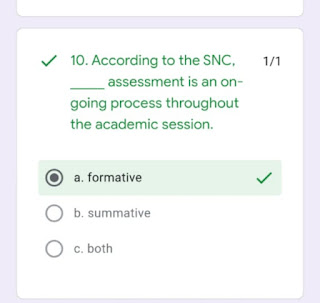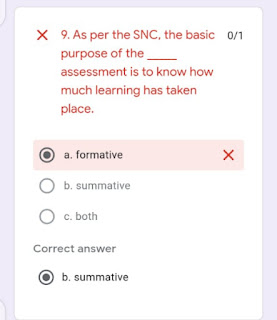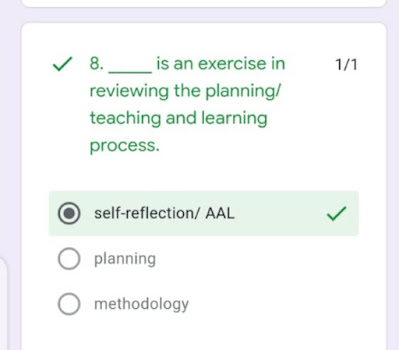If you are looking for teacher job professional and teacher evaluation MCQ questions from National Professional standards then you will find 100 MCQs for teacher test in Pakistan. These Teacher MCQs are taken from National Professional Standards of Pakistan, SNC subject guides, Subject specific pedagogies, . These teacher test MCQs are to be prepared for teacher job test of government jobs and private teacher jobs. These teacher NPS- MCQs, are also get you prepared for Teachers' Professional and Evaluation Test MCQs .
Here is teacher Test MCQs online:
SECTION 1 - OBJECTIVES
Q1: Chose the appropriate National Professional Standard for the given statement.
(1x10=10)
1. The development of student’s critical thinking, independent problem solving and performance
capabilities are part of standard:
a. Instructional planning and strategies
b. Subject matter knowledge
c. Knowledge and understanding
Ans: a
2. Teacher must know techniques for developing/modifying instructional methods, materials and the
environment to help all students learn.
a. Performance and skills
b. Knowledge and understanding
c. Dispositions
Ans: b
3. Which form of the following is NOT a formal assessment?
a. Interview
b. Observation
c. Quizzes
Ans: b
4. Teacher must be committed to tolerance and celebration of diversity
a. Subject matter knowledge
b. Human growth and development
c. Knowledge of Islamic ethical values/social life skills
Ans: c
5. Teachers engage in activities to apply learning theories to accommodate differences in students’
intelligence, perception and cognitive style in achievement levels.
a. Subject matter knowledge
b. Human growth and development
c. Instructional planning and strategies
Ans: b
6. Teacher must understand the processes and skills that help students to develop knowledge, skills and
dispositions of reflective thinking and enable students to solve problems in classroom and out of class
a. Human growth and development
b. Instructional planning and strategies
c. Subject matter knowledge
Ans: a
7. Teachers engage in activities to create a learning community in which individuals and their opinion are respected:
Knowledge of Islamic Ethical values/social life skills
b. Instructional planning and strategies
c. Human growth and development
Ans: a
Use formal and informal methods of assessment, information about students, pedagogical knowledge,
and research as sources for active reflection, evaluation and revision.
a. Assessment
b. Instructional Planning & strategies
c. Subject Matter knowledge
Ans: b
9. Teachers engage in activities to analyze student performance using multiple sources of data, and to
modify future plans and instructional techniques that promote desired students learning outcomes.
a. Instructional Planning & strategies
b. Subject Matter Knowledge
c. Assessment
Ans: c
10. Teacher values the belief that students’ learning outcomes are the basis for growth and the deficiencies
are opportunities for learning.
a. Assessment
b. Instructional planning and strategies
c. Human development and growth
Ans: a
Here is teacher test MCQs for preparation, teacher SSP subject specific pedagogies test MCQs, NPS MCQs, SNC MCQs for teacher tests in Pakistan .
Q2: Who am I?
(1x10=10)
1. I am one of the form of group interaction which strengthen the communication skills and create
familiarization with the art of academic discourse.
a. Discussion
b. Graphic organiser
c. tests
Ans. a
2. I am one of the most important strategies in which students works together in small groups/pairs to
maximize their own and each others’ learning.
a. Group studies
b. Cooperative Learning
c. Trips
Ans. b
3. I am a concept in which learning take place through direct sensory experience such as learning what an
orange is through touch, taste, sight.
a. Charts
b. Audio aid
c. Spontaneous
Ans. C
4. I can be a powerful aid to memory, understanding and concept development.
a. Concept mapping
b. Graphic organizer
c. Flow chart
Ans. a
5. I can add colour, textures, variety and order to areas which would otherwise be drab.
a. Charts
b. paint
c. Displays
Ans. C
6. I am one of the way of dividing the whiteboard, which effectively divides the board into four.
a. T chart
b. C model
c. H model
Ans. C
7. I am helpful in developing observation, cooperation skills, imagination, creativity and feelings of
empathy for the people in pictures.
a. Drawing
b. Flow chart
c. Tests
Ans. a
8. I can be used to encourage creativity, generate a lot of ideas very quickly, arouse the interest and
determine what they already know.
a. Brainstorming.
b. Quizz
c. Memory
Ans. a
9. I am a valuable tool for continuous motivation.
a. Punishment
b. Appreciation.
c. Ignorance
Ans: b
10. I am a core teaching methodology used as tool for organizing already available information with children
into meaningful thinking pattern.
a. Questioning
b. Tests
c. Display
Ans. a
20. The 'Single National Curriculum' aims and objectives, according to the Ministry of Federal Education and Professional Training, are:
a. to ensure that all children in Pakistan have equal chances for high-quality education and upward social mobility
b. to provide quality education to all children
c. to bring all children to school
Ans: a
22.SNC single national curriculum focusses on:
a. development of analytical, critical and creative thinking through a more activities-based approach rather than static teacher centric learning.
b. development of physical approach
c. student learning outcome approach
National Professional Teaching Standards teacher test MCQs (10 x Items)
23. Which instructional strategy involves providing students with immediate feedback on their performance?
a. Direct instruction
b. Formative assessment
c. Summative assessment
d. Cooperative learning
Ans. a
24. Which Islamic scholar is known for his work in algebra?
a. Al-Farabi
b. Ibn al-Haytham
c. Al-Khwarizmi
d. Al-Razi
Ans. C
25. What is the purpose of educational assessment?
a. To rank students based on their performance
b. To measure the effectiveness of teaching methods
c. To compare schools in terms of
resources
d. To determine the popularity of a subject
Ans. a
26. A scoring guide used to know the quality of students is known as:
a. Rubrics
b. quiz
c. exams
Ans. a
27. Human growth and 0/1 development' is the professional standard for initial preparation of teachers in Pakistan.
a. 4th
b. 7th
c. 2nd
Correct answer
c. 2nd
28. Learning through professional educational organisations' is included in standard
a. 9-A
b. 9-B
c. 9-C
Correct answer
c. 9-C
29./According to SNC, -------- assessment is an on going process throughout academic year.
a. formative
b. summative
c. both
correct answer: formative
30. A_______is defined as a key learning area that involves applied skills and knowledge enabling learners to successfully perform in educational, professional and other contexts of life.
a. competency
c. benchmarks
b. standards
Ans. Competency
31. for grade I and II ----------- define what the students will be able to do by the end of grade II.
a. competency
b. standards
c. benchmark
Correct answer
c. benchmark
32. As per the SNC, the basic purpose of the assessment is to know how much learning has taken place.
a. formative
b. summative
c. both
Correct answer
b. summative
33. is an exercise in reviewing the planning/ teaching and learning process.
a. self-reflection/ AAL
b. planning
c. methodology
correct answer: AAL
34. "Assessment and Analysis Folder" has to be maintained by:
a. class teachers
b. subject teachers
c. all teachers
Correct answer
c. all teachers
35. A teacher is supposed to keep in the 'Assessment and Analysis Folder'.
a. test results, record of the struggling learners, class meeting record.
b. test papers, record of the struggling learners, class meeting record.
c. test papers, record of PTMs, record of the academically struggling learners
correct answer: a
36. Assessment as Learning (AAL)/Self-reflection is written
a. at the end of the week
b. during the week
c. before the week starts
Correct answer
a. at the end of the week
37. The Monthly Coordination Meeting is held to:
a. review the previous month's work.
b. plan the work to be done in X the coming month
c. both a and b
Correct answers
a. review the previous month's work.
38. The Class Improvement Plan (CIP) must align with the
a. academic calendar
b. SIP (School improvement plan)
c. both
Correct answer
b. SIP
What is SLO(student learning outcome) based Exam mean in Pakistan:
a. conceptual learning based exam
b. rote learning based exam
c. only textbook based exam
Ans. a
40. What are strands in a lesson plan?
(a) the disciplines within a learning area, e.g. history, geography, economics and civics under 'social studies', each with its own associated goals for learning
b) the goals of each academic year
c) the levels to achieve throughout the year
correct ans: a
41.What are the 4 strands of English?
a. Listening, Speaking, Reading and Writing
b. Listening, Seeing, observing, writing
c. Reading, observing, speaking, applying
Ans. a
42. Curriculum Standards in Pakistan determine:
a. expectations for students' performance and describe the Knowledge; Skills and Values students need to be successful in today's world.
b. analytical development of students
c. social development of students
correct ans: a
43. Standards in any subject determine:
a. skill improvement of students
b. expectations of students' performance in the subject and describe what students should know and do to be successful.
c. what students know about the subject that is shown in the book.
Ans. b
44. Each of the Standards of the subject Curriculum must be pursued at:
a. each school level
b. each province level
c. each grade level.
Ans. c
45. Benchmarks establish what students are expected:
a. to know and be able to do at various developmental levels.
b. to know at various age levels
c. to learn at next study level
Ans: a
46. Benchmarks are set goals are identified so as to indicate:
a.
students' expectations at the end of each developmental level, that is, the early years (Grades I-III), primary level (Grades IV-V), middle level (Grades VI-VIII) secondary level (Grades IX-X) and higher secondary level (Grades XI-XII).
b. students level at the start of each year.
c. students goals for the life
Ans. a
47. The National Curriculum further identifies the Learning Outcomes for:
a. students in each class.
b. teachers in the school
c. all students of the school
Ans. a
48. SLO Students' learning outcomes are specific statements that describe:
a. the Knowledge, Skills and Abilities that student must demonstrate at the end of the academic year when they have completed the study of their course.
b. the marks the students get at the end of each year.
c. the skill students know at the end of each year.
Ans. a
51. What AAL in education:
a. Assessment as learning
b. Answer as learning
c. Assessment as level
Ans. a
52. When AOL is done in lesson plan:
a. Assessment of learning is done at start of term/week
50. The National Curriculum must be supported by:
a. effective teaching in the class room and assessment practices that measure the attainment of the Students' Learning Outcomes.
b. effective support of school
c. effective exam system
Ans. a
Here is a detail of National professional standards for teachers in Pakistan:
You can prepare teacher tests of FPSC, PPSC, or evaluation teachers tests from here:
Here are 10 national professional standards for teachers and their three main components:
10 Professional Standards for Initial Preparation of Teachers in Pakistan
NPS for teachers in Pakistan
Standard 1: Subject matter knowledge
Standard 2: Human growth and development
skills
Standard 3: Knowledge of Islamic ethical values/social life
Standard 4: Instructional planning and strategies
Standard 5: Assessment.
Standard 6: Learning environment
Standard 7: Effective communication and proficient use of information commun technologies
Standard 8: Collaboration and partnerships
Standard 9: Continuous professional development and code of conduct
Standard 10: Teaching of English as second/foreign language (ESL/EFL)
Composition of Professional Standards
Each standard has 3 parts
a. Knowledge and Understanding (Content)
What teacher knows
b. Dispositions
Behaviors, attitude and values
c. Performances (Skills)
What teacher can do and should be able to do





